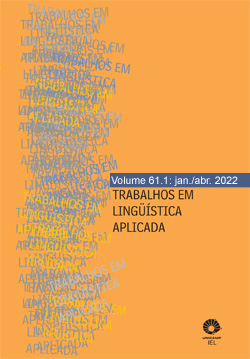Abstract
Denominative variation in terminology, that is, the use of different names to designate the same concept or nuances of the same conceptual reality, is often considered as a mere stylistic resource or a strategy of thematic progression. It can present, however, distinct conceptual patterns and distinct intra-term relations, which means that the units are not always semantically equivalent. Thus, much more than a thematic progression mechanism, variants act as a discursive and cognitive resource to highlight different conceptual nuances of terminological units. In this sense, in this article, based on the assumptions of modern trends in Terminology, in particular on the Communicative Theory of Terminology (CABRÉ, 1999, 2005) and on the classification of conceptual specification patterns by Kageura (2002), we aim to analyze conceptual patterns and intra-term relations present in terminological variants of Economics. Through this analysis, we intend to show which conceptual information is highlighted in these terminological units and how they can influence the understanding and construction of specialized knowledge.
References
ALVES et. al. (2001). Glossário de Termos Neológicos da Economia. São Paulo: Humanitas/FFLCH/USP.
ALVES, I. M. (2016). As denominações da crise econômica mundial no entrecruzamento da Economia e da Medicina. Filologia e Linguística Portuguesa. São Paulo, v.18, n.1, p. 43-64.
ARNT, R. (2016). O ajuste que não houve em 1963. Valor Econômico.
BORBA, F. S. (1996). Uma gramática de valências para o português. São Paulo: Ática.
CABRÉ, M. T. (1999/2005). La terminología: representación y comunicación. Elementos para una teoría de base comunicativa y otros artículos. Barcelona, Universitat Pompeu Fabra, Institut Universitari de Lingüística Aplicada.
CABRÉ, M. T. (2002). Terminología y Lingüística: la teoría de las puertas. Estudios de Lingüística del Español. Acesso em: 18 ago. 2021.
CAMPOS, E. (2008). Fundos de ações captam US$ 8,4 bilhões na terceira semana de dezembro. Valor Econômico.
COSTA. L.A.; FERNÁNDEZ-SILVA, S. (2018). Análisis de la función cognitiva de la variación denominativa en la Lexicografía brasileña: patrones conceptuales de variación y distancia semántica entre las variantes. Revista Meta, v. 63, n.2, p.467-491, 2018.
FABER, P. et. al. (2006). Process-oriented terminology management in the domain of Coastal Engineering. Terminology. Vol. 12 (2), p. 189-213.
FABER, P. (ed.) (2012). A cognitive linguistics view of terminology and specialized language. Berlin & Boston: Mouton de Gruyter.
FERNÁNDEZ-SILVA, S. (2011). Variación terminológica y cognición: factores cognitivos en la denominación del concepto especializado. Barcelona: IULA-TDX.
FERNÁNDEZ-SILVA, S.; FREIXA, J.; CABRÉ, M. T. (2011). A proposed method for analysing the dynamics of cognition through term variation. Terminology. Vol.17 (1), p. 49-74.
FREIXA, J. (2002). La variació terminològica: Anàlisi de la variació denominativa en textos de diferent grau d’especialització de l’àrea de medi ambient. Barcelona: IULA.
FREIXA, J. (2005). Variación terminológica: ¿por qué y para qué? Meta. Vol. 50(4): CD-ROM.
FREIXA, J. (2006). Causes of denominative variation in terminology: A typology proposal. Terminology. Vol. 12(1), p. 51-77.
GRANER, F.; CAMPOS, E. (2018). Governo prioriza custo e eleva fatia da dívida ligada à Selic. Valor Econômico.
HOUAISS, A.; VILLAR, M.S. (2009). Dicionário Houaiss da língua portuguesa. 1. ed. Rio de Janeiro: Objetiva.
KAGEURA, K. (2002). The dynamics of terminology: A descriptive theory of term formation and terminological growth. Amsterdam/Philadelphia: John Benjamins.
LAMUCCI, S. (2015). Emergentes são especialmente vulneráveis à alta do dólar. Valor Econômico.
MILL, A. (2017). Tudo o que você precisa saber sobre Economia. São Paulo: Editora Gente.
MODALMAIS. (2021). Flipar: saiba como ganhar dinheiro com IPOs. https://www.modalmais.com.br/blog/flipar-como-ganhar-dinheiro-com-ipo. Acesso em: 15 jun. 2021.
MUNDO EDUCAÇÃO. (2021). OMC — Organização Mundial do Comércio. https://mundoeducacao.uol.com.br/geografia/omc.htm. Acesso em: 20 ag. 2021.
SANDRONI, P. (2008). Dicionário de Economia do Século XXI. Rio de Janeiro: Editora Record.
TEMMERMAN, R. (2000). Toward New Ways of Terminology Description: The Sociocognitive Approch. Amsterdam: John Benjamins.
WERNER, A. (2018). Perspectiva para as Américas: recuperação mais difícil. Valor Econômico.
WÜSTER, E. (1998). Introducción a la teoría general de la terminología y a la Lexicografía terminológica. In: María Teresa Cabré (ed.) Barcelona: IULA-UPF.

This work is licensed under a Creative Commons Attribution 4.0 International License.
Copyright (c) 2022 Trabalhos em Linguística Aplicada


